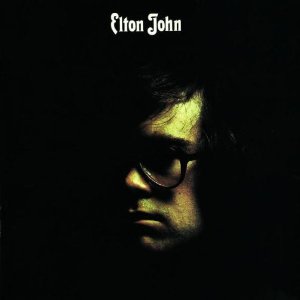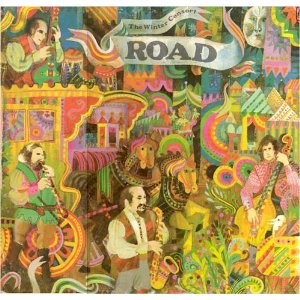The Age of Dross Begins
Theme Songs Page | Previous Theme Song | Next Theme Song
The Age of Dross Begins
The King Must Die! By Bernie Taupin and Elton John, performed by Elton John (1970), encountered 1970?
Buy it here | See it here | Lyrics here
Icarus, by Ralph Towner, performed by the Paul Winter Consort (1970), encountered 1971
Buy it here | See it here | Sheet music here
The albums piled up in the room of my housemate Otts, the music editor of the arts supplement to the campus paper. In fragmentary but decided fashion they told the tale: The three-minute song was growing obsolete. Singer-songwriters were now artistes, with all the pretensions that went with the role. Monaural AM was no longer a reliable place to hear the good new stuff.
The musical Age of Gold in which I had grown up was just about over. Whatever the merits of whatever was coming next, it wouldn’t be the gold I still wanted. Wanted so badly, in fact, that I was willing to squint extra hard to see it in all the new vinyl that came sluicing into our house.
But of course when you squint, you are apt to see things that aren’t, strictly speaking, uh, there.
But Then Again No
One artist who turned up on Otts’ floor at this juncture in whom I ended up trying hard to see the gold was Elton John. And he was some kind of gold isotope: he had the voice and the mannerisms to deliver a song, as well as the ear to compose catchy melodies. The trouble was, his lyricist was Bernie Taupin. That is sort of like Beethoven trying to be a great composer while limited to writing for the kazoo.
When John’s first significant album came out, I really tried to look past the lyrics. That first number, Your Song, as a melody, was everything a pop love song could be. But the awful lyrics were right there:
If I were a sculptor, but then again no. Or a man who makes potions in the traveling showNo, what? Or is the no there just to rhyme with show, which itself caps off a verse referencing a skill completely irrelevant to the singer’s aspiration to show the beloved how much he loves her?[1] If not, name the task for which sculpture is inadequate but for which potion-making could be considered an improvement? If Taupin were a lyricist, but then again no …
I could go on. The thing was, I was still listening to the album a lot because of John’s magnetism as a singer. But it kept not being utterly wonderful.
Ostlers, Mercenaries and Other Pointless Imagery
The song that ended the album was the one I played the most: The King Must Die! To a student reading Chaucer and Shakespeare as I was at the moment, the medievalism and renaissancery of the lyrics, not to mention the dramatic central situation suggested by the title, was enough to hook me. Yet I kept not loving it as much as I wanted. Coming back to it 40 years later (and I include the beginning lyrics in an endnote so the reader can come back to it too),[2] it smacks me in the face: Who’s talking and who’s listening? Stanzas 1-4 seem to be addressing a “king,” although there’s a strong hint he may simply be an everyman. Stanza 5 sounds more like a response by the king. But there are no clues in the music or the delivery. In any case, the king seems to be in an ominous (in the literal sense of the word) situation. But the omens seem wide of the mark: “Tell the ostler that his name was / The very first they chose.” Well, so what? Ostlers aren’t kings, and usually aren’t even addressed by kings. What’s so bad for the king that someone chose the ostler? Chosen for what? And why are mercenaries singing in cloisters? Shouldn’t it be monks?[3] And if you must worry about mercenaries, isn’t it actually more reassuring to have them singing in cloisters than besieging your towns? In any case, the dramatic gravity of the music, underlined by Paul Buckmaster’s masterful arrangements, is utterly unearned.
At this point it would be a reasonable objection that Dylan did lots of the same thing. I admit it, it’s true. I’ve even written about that strain of Dylan right in this blog. It’s just that Dylan was a genius who could get away with that sort of thing.[4] And for that matter, Chaucerian touches worked well for Procol Harum in A Whiter Shade of Pale, even though there, as here, they didn’t add up to much. But then that song was deliberately mysterious and impenetrable; that diverting talk about millers and hosts was meant to be disorienting, along with psychedelicisms about the ceiling flying away.
As I say, I listened to the album a lot, but interestingly, when I look back, I see I wrote at the time that: “with big new stars, like, say, Elton John, it’s impossible to determine, from their albums alone, whether they deserve their status or not, after you take into account the hype and arranging in back of them.” So I guess I never quite convinced myself, even though now the source of my discomfort has little to do with the hype.
Reviewing Against the Grain
The comment I just quoted came from a review I wrote (at Otts’ suggestion) of the Paul Winter Consort’s Road album.[5]
Today, Paul Winter and his saxophone and his ensembles are shelved with the New Age musicians. I tried to write about them as if they were to be considered along with rockers, likening the album to Sgt. Pepper. My license to draw the comparison was the strong use of classical music elements in both, and the willingness of both albums to draw inspiration from anywhere. But I tried to sell Paul Winter to my audience as if he and his consort were some kind of act to compare with, for instance, other acts mentioned in that issue of the paper: Laura Nyro, Richie Havens, the Youngbloods, Seatrain.
I wasn’t smart enough to take in that there were things out there besides classical, jazz, and rock – and that eclecticism didn’t necessarily lump an act with rockers. This was my introduction to a new flavor, but my musical taxonomy wasn’t up to it.
I wasn’t wrong, though, about finding it fascinating, powerful music. My Theme Song from the album – which has become Paul Winter’s own theme song, even though it was written by the guitarist in the Consort, Ralph Towner – was Icarus. The mythical Icarus, the fabricator of wings, flew too near the sun and paid with his life for his presumption. Towner’s Icarus, so far as I can make out from the song, just discovers how intoxicating it is to fly. The music is all about soaring, not falling. There are wistful minor chords, to be sure, but just to make your breath catch as he upshifts into the major.
Not Bad for Not Rock
It is one of the great melodies, and covered in subsequent years by artists of all stripes. I am particularly fond of a cover by Towner himself with a couple of other guitarists, of which there is a fine YouTube video here and of a cover by jazz pianist Stef Scaggiari.
A wonderful thing, but not rock gold, because not rock. Maybe the reason, apart from my naivete, that I tried so hard to sell it to my contemporary 1971 readers as some kind of rock substitute was that if I had acknowledged it was something different and sui generis (at that time, anyhow), I’d have to acknowledge I was getting somewhat to one side of the popular tastes of the day, going back to being a bit of a wonk, as I’d started out. Maybe, except for this: there is nothing wonkish about that sublime melody. Listen to it, and you’ll want to soar too.
[1] Well, if it is a her. We all know now about John’s sexual orientation, but at that time he was in the closet to his American fans. (He apparently came out as bisexual in 1976, but it was only much later that he self-identified as gay.)
[2] No man’s a jester playing Shakespeare
Round your throne room floor While the juggler’s act is danced upon The crown that you once wore And sooner or later Everybody’s kingdom must end And I’m so afraid your courtiers Cannot be called best friends Caesar’s had your troubles Widows had to cry While mercenaries in cloisters sing And the king must die Some men are better staying sailors Take my word and go But tell the ostler that his name was The very first they chose And if my hands are stained forever And the altar should refuse me Would you let me in, would you let me in, would you let me in Should I cry sanctuary[3] And I’ll confess I’m charmed by the “Roman cavalry choirs were singing” in Coldplay’s Viva la Vida (2008) — but Coldplay also know what they’re doing with the lyrics. In their hands this is clearly an extravagant metaphor for the exalted feelings one experiences while successful in love.
[4] Similarly, compare two couplets, one from Taupin, one from Dylan, that describe things that cannot possibly happen to a piece of headwear:
Taupin: While the juggler’s act is danced upon The crown that you once wore Dylan: You know it balances on your head Just like a mattress balances on a bottle of wine(From Leopard-Skin Pill-Box Hat (1966).) Dylan knows he’s spewing nonsense, with the aim of making you laugh. Dylan knows mattresses don’t balance on bottles of wine, leading to a busted simile; that’s what makes it funny. Taupin is trying to be portentous but fails to notice that he’s describing the literally impossible. That what makes it unimpressive. Advantage Dylan.
[5] 34th Street, February 25, 1971 at 8.
Copyright (c) Jack L. B. Gohn, except for album art

